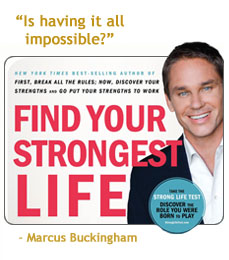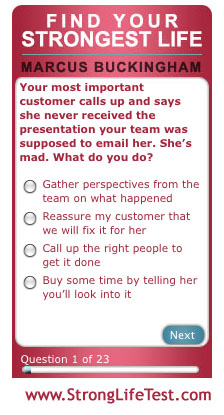 Marcus Buckingham, a workplace consultant who has helped companies ranging from Disney to Toyota cultivate highly engaged employees, was invited to appear on the Oprah Winfrey Show about two years ago to lead a career workshop for a group of working women. Buckingham and his coaches counseled the show’s participants on how to overcome challenges in the workplace.
 What happened after the program hit the airways was nothing short of amazing. Over two million people visited Oprah.com to download the entire three-hour workshop and more than a hundred thousand people, mostly women, posted messages on the website about the show. Most wanted help balancing their work, their goals, and their lives. Women wanted to know how to juggle being a mother, wife, and employee. How could they cope with all the competing demands on their lives?
In response, Buckingham wrote his new book, Find Your Strongest Life: What the Happiest and Most Successful Women Do Differently, to give working women some detailed, practical answers. But to anyone familiar with previous self-help books that tell women how to "multi-task" and achieve a "balanced" life, what he has to say might at first sound like heresy.
According to Buckingham, all that advice women that have been bombarded with about "balancing" career and family and personal needs has been wrong. In fact, he says women should go for a state of imbalance -- in other words, don’t try to cover every single base, but instead tilt your life and goals toward personal strengths that produce the most satisfaction.
Is "having it all" really possible for anyone -- women or men?
The phrase "you can have it all," long attributed to feminist icon Gloria Steinem, is a kind of mantra for the multi-tasking modern woman. Those words have inspired -- or guilt-tripped, depending on your point of view -- a generation of women into believing they could, and should, successfully juggle family, career, community involvement, relationships, and other myriad activities with equal success and balance.
Unfortunately, despite all the new opportunities for women, research has shown that women in general feel less happy, more rushed, and more stressed than they did forty years ago and, as they age, sadder.
 In response, Buckingham points out that no one can really "have it all" -- IF that means being all things to all people. Instead, he suggests "having it all" should simply mean finding the path that brings more joy, satisfaction, and personal fulfillment. The key is realizing you can’t have everything, all the time.
Even Gloria Steinem has stated that she was misunderstood. In fact, she has said she never told women "you can have it all."
Buckingham reports that his research involving tens of thousands of women (and men) in the US, UK, Canada, China, Japan, and India shows a strong life isn’t proven by what you do. It’s what you feel. Regardless of the life choices different women make, if those choices are right for them personally, they end up sharing the same four feelings:
- They feel successful.
- They instinctively look forward to tomorrow.
- They are growing and learning new things, no matter what their age.
- They feel their needs are fulfilled.
Buckingham says his book’s message is that you can experience these four feelings by connecting with the strengths you find in your own life. Using his expertise as a psychometrician (someone who builds tests to measure personality), Buckingham created the Strong Life Test to help women sort through what he calls the noise of competing voices, expectations and demands in any situation they face, whether as a wife, friend, mother, or employee. He describes the test (which you can take at StrongLifeTest.com) as a kind of compass to help women identify what kind of work and life moments strengthen, invigorate, and bring them joy.
 Based on his analyses of personality test results conducted over the past 20 years, Buckingham has come up with nine "Life Roles": advisor, caretaker, creator, equalizer, influencer, motivator, pioneer, teacher, and weaver. The Strong Life test helps reveal which role best fits you. While it doesn’t give all the answers, Buckingham says his self-help test can help unsatisfied women start identifying their strengths to create a strong, successful life.
You may not be the same sort of mother -- or wife or employee -- as everyone else, and taking the Strong Life test can help you identify the role that is your most comfortable, happiest approach to life.
Don’t juggle. Instead, catch and cradle
After studying the happiest and most successful women -- whether they have careers or not, or have husbands and kids or not -- Buckingham concludes they have something in common. They don’t "juggle" the myriad aspects of their lives. Instead, they catch. They go after the clear, strong moments they experience that are fulfilling, energizing, and joyful and they go after them.
So, instead of trying to juggle your responsibilities and goals, Buckingham advises what he has dubbed a "catch and cradle" approach -- deliberately reach out for specific moments to cradle, much like you would cradle a baby. Concentrate on the moments that make you feel strong and fulfilled and allow them to move you.
"You want to imbalance your life toward creating more of those specific moments. It’s a very different approach. It’s not ‘learn to say no,’ it’s ‘learn to say yes,’" he points out. "Learn who you are clearly enough to know which moments you need to say ‘yes’ to, and understand that the moments won’t be the same for your sister, or your next-door neighbor, or your co-worker."
|